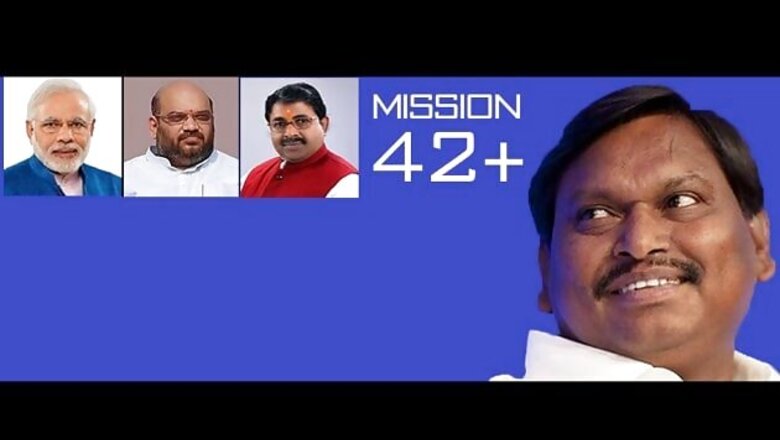
views
Jharkhand will celebrate its 14th foundation day on November 15, 2014 even as political parties are getting ready to fight one more battle to secure the reins of the state. Ever since the state was carved out of Bihar, Jharkhand has never been politically stable and has seen nine chief ministers and three terms of President's Rule since November 2000.
The state's politics has been the perfect example of revolving door and the "Aaya Ram, Gaya Ram" syndrome with government falling like nine pins as smaller parties and independents made merry. In a bizarre turn of events one of them even went on to become the chief minister of the state.
The independent MLA, Madhu Koda, was backed by the Congress and ruled the state for 23 months and five days but resigned after refusing to take a floor test. In fact Koda's rule from September 14, 2006 to August 23, 2008 is considered the worst period for the state till date as his regime was only known for the blatant loot of the state. Koda and five of his ministers were charged in corruption cases and sent to jail.
While politics is always interesting, no where it gets more colourful than Jharkhand, the richest state of India but with a leadership totally clueless on how to put the state on the path of development.
Several parties like the Jharkhand Mukti Morcha (JMM), which espoused the cause for a separate state and finally succeeded in their endeavour, never had any compulsions in supporting other parties for the sake of power and to take part in the loot of the state.
JMM founder Shibhu Soren and his son Hemant Soren have been the chief ministers of the state but neither have done much for the land they belong to. JMM has enjoyed the spoils of power in partnership with both the Congress and Bharatiya Janata Party (BJP) in a flagrant display of opportunistic politics. In fact Shibhu Soren popularly known as Dishom Guru or Guruji one failed to win an Assembly by-election and had to quit as the chief minister.
Later in 2009 JMM and BJP joined hands to grab power but the former ditched its alliance partner by voting with the Congress-led United Progressive Alliance government on Opposition-sponsored cut motions which led to the fall of the Soren government in Jharkhand.
While the Naxal-infested state votes in a five-phase election from November 25 to December 20, the BJP which stormed to power after winning the 16th Lok Sabha elections just a few months back is confident of giving Jharkhand its first single-party majority government.
In a strange paradox, Jharkhand voters have always decisively voted for one party in a Lok Sabha election but given a badly fractured mandate in Assembly polls just a few months later. In the April-May Lok Sabha elections the BJP won 12 of the 14 Lok Sabha seats in the state and led in 56 Assembly segment, which is way above the half-way mark of 41 in the 81-member Assembly.
But Jharkhand voters have never shown the same kind of enthusiasm for one party in Assembly elections. Their preference has changed dramatically in all the elections ever since the state's formation.
In 2004 the BJP was heading the state government but the 14th Lok Sabha elections saw the Congress and its allies winning 13 seats. On the other hand BJP could bag just one seat.
Yet just a few months later in early 2005, it was the BJP which won the bragging rights after bagging 30 seats while its allies has six seats in their kitty. On the other hand the Congress and JMM won just nine and 17 seats each.
A similar trend emerged in 2009 Lok Sabha and Assembly elections too. While the BJP bagged eight seats in Lok Sabha elections, Assembly elections were not a cake walk as the party ended with only 18, the same number as won by the JMM.
While the voters have always given a clear verdict in favour of a party in Lok Sabha elections, their failure to do so in Assembly elections can be attributed to the lack of strong regional leaders who have pan-state appeal.
A few years back, leaders like Shibu Soren and Babulal Marandi were popular all over the state but they have lost the magic touch after failing to deliver. With several smaller parties and a few independents having their own areas of influence, the Assembly elections become a minefield even for the most experienced and veteran political leaders.
But with the electorate weary of coalition rule, lack of development, rising Naxal threat and over all deterioration in law and order, the stage is set for the BJP to continue its triumphant march especially after its good show in Haryana and Maharashtra.
With the Hemant Soren government highly unpopular and also having lost the Congress support, the BJP is in the driver's seat. A faction-ridden Congress and other regional parties yet to recover from the Narendra Modi wave that swept the sate in April-May Lok Sabha elections, the chances of a single-party rule in Jharkhand after a wait of one-and-a-half decades seem very bright.


















Comments
0 comment